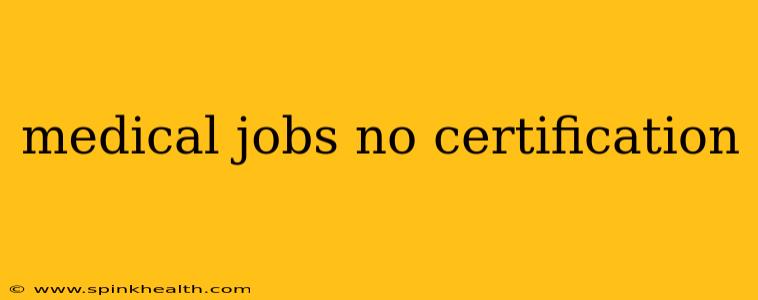Medical Jobs You Can Land Without Certification: A Guide to Entry-Level Opportunities
The medical field often conjures images of highly trained professionals with years of schooling and specialized certifications. But the reality is, many rewarding and vital roles exist that don't require years of intensive education or specific certifications. If you're drawn to the medical world but lack formal certifications, don't despair! Numerous entry-level positions offer a foot in the door, allowing you to gain experience and potentially pursue further training down the line. Let's explore some of them.
My name is Sarah, and I've spent the last 10 years working in various medical settings, both in administrative roles and directly supporting healthcare professionals. I've seen firsthand the importance of these often-overlooked positions, and I'm excited to share my knowledge and help you find your place in the medical community.
What are some medical jobs that don't require certification?
This is a common question, and the answer depends largely on your skills and interests. Many roles emphasize soft skills like communication, empathy, and attention to detail – qualities often more valuable than formal qualifications.
What are some entry-level medical jobs that don't need certifications?
Many entry-level positions prioritize experience and train you on the job. This allows you to build a foundation, learn the ropes, and potentially qualify for more advanced roles later.
-
Medical Receptionist: This is a cornerstone role in any medical practice. You'll be the first point of contact for patients, handling scheduling, insurance verification, answering phones, and maintaining patient records. Strong communication and organizational skills are essential.
-
Medical Assistant (in some settings): While many medical assistant positions require certification, some clinics and smaller practices may hire individuals with strong skills and train them on the job. This route typically involves a longer training period and might focus on specific tasks rather than the full scope of an RMA (Registered Medical Assistant). Always inquire directly about training opportunities.
-
Medical Scribe: Scribes work alongside physicians, documenting patient encounters in real-time. Excellent typing skills, medical terminology knowledge (which can be learned on the job), and a keen attention to detail are crucial.
-
Home Health Aide: Assisting elderly or disabled individuals with daily tasks like bathing, dressing, and meal preparation requires compassion and patience more than formal certification. While certification is beneficial, many agencies are willing to train the right candidates.
-
Phlebotomist (in some settings): Similar to medical assistants, some phlebotomy positions might accept applicants without formal certification, particularly if they are willing to undergo on-site training. However, certification is generally preferred and highly recommended.
-
Hospital Clerical Staff: Hospitals need skilled administrative staff in various departments, including billing, records, and admissions. While medical knowledge isn't always required, excellent organizational and communication abilities are vital.
-
Medical Office Assistant: This broadly defined role encompasses a variety of administrative tasks, from filing and data entry to scheduling and assisting with patient flow.
How can I increase my chances of getting a medical job without certification?
While formal certifications aren't always mandatory, you can still significantly improve your prospects.
-
Highlight transferable skills: Even if your past experience isn't directly in healthcare, emphasize relevant skills like customer service, data entry, teamwork, and problem-solving.
-
Develop relevant skills: Consider taking online courses in medical terminology, medical billing and coding, or even basic first aid and CPR. These demonstrate initiative and commitment.
-
Network: Attend healthcare industry events, connect with professionals on LinkedIn, and reach out to local medical practices to inquire about openings.
-
Gain experience through volunteering: Volunteering in a hospital or clinic provides invaluable experience and demonstrates your passion for the field. This can often lead to paid positions.
Starting a career in the medical field without prior certification is entirely achievable. By focusing on your strengths, actively developing relevant skills, and demonstrating a genuine commitment to patient care, you can find a fulfilling and rewarding role that opens doors to future opportunities. Remember to tailor your resume and cover letter to each specific job application, highlighting your transferable skills and eagerness to learn. Good luck on your journey!

